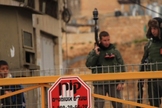26 feb 2016
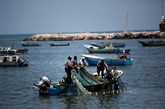
Israeli naval forces early Saturday opened fire on Palestinian fishing boats working off the coast of Gaza City, with no injuries reported, fishermen said.
Fishermen told Ma’an their boats were damaged when Israeli forces opened fire at the vessels while they were working around four nautical miles off the coast of the central Gaza Strip.
An Israeli army spokesperson told Ma’an they were looking into the reports.
Palestinian fishermen are frequently targeted by Israeli forces, facing near daily harassment and interference with their work. Israel's army routinely says such measures are necessary to counter security threats.
As part of a ceasefire between Israel and Palestinian militant groups in the summer of 2014, Israel agreed to expand the fishing zone off of Gaza's coast, allowing fishermen to sail as far as six nautical miles from shore, and to continue to expand the area gradually.
Despite this agreement, the Hemaya Center for Human Rights reported that the Israeli navy opened fire on Palestinian fishermen at sea at least 159 occasions in 2015.
At least three fishermen were killed last year while working off of the Gaza coast, which has been under naval blockade by Israeli forces since 2007.
Seventy fishermen were detained by Israeli forces last year, including seven children, and 26 boats were confiscated, according the center.
Fishermen told Ma’an their boats were damaged when Israeli forces opened fire at the vessels while they were working around four nautical miles off the coast of the central Gaza Strip.
An Israeli army spokesperson told Ma’an they were looking into the reports.
Palestinian fishermen are frequently targeted by Israeli forces, facing near daily harassment and interference with their work. Israel's army routinely says such measures are necessary to counter security threats.
As part of a ceasefire between Israel and Palestinian militant groups in the summer of 2014, Israel agreed to expand the fishing zone off of Gaza's coast, allowing fishermen to sail as far as six nautical miles from shore, and to continue to expand the area gradually.
Despite this agreement, the Hemaya Center for Human Rights reported that the Israeli navy opened fire on Palestinian fishermen at sea at least 159 occasions in 2015.
At least three fishermen were killed last year while working off of the Gaza coast, which has been under naval blockade by Israeli forces since 2007.
Seventy fishermen were detained by Israeli forces last year, including seven children, and 26 boats were confiscated, according the center.
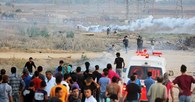
Three Palestinian youths were injured Friday afternoon after Israeli Occupation Forces opened fire at the eastern and southern borders of Gaza.
Local sources affirmed that two young men were hit and injured when Israeli forces stationed at the border areas east of Gaza City opened fire at Palestinian protesters.
Several others suffered effects of teargas inhalation, the sources added. The PIC news reporter earlier said that a Palestinian youngster was transferred to the European Hospital in Gaza after suffering a live shot injury.
The injured young man was targeted by Israeli forces east of Khan Younis south of the besieged Strip.
Gaza border areas have witnessed increasing tensions, resulting in the killing of 25 Palestinians and the injury of 800 others ever since solidarity marches with the Jerusalem Intifada started five months ago.
Local sources affirmed that two young men were hit and injured when Israeli forces stationed at the border areas east of Gaza City opened fire at Palestinian protesters.
Several others suffered effects of teargas inhalation, the sources added. The PIC news reporter earlier said that a Palestinian youngster was transferred to the European Hospital in Gaza after suffering a live shot injury.
The injured young man was targeted by Israeli forces east of Khan Younis south of the besieged Strip.
Gaza border areas have witnessed increasing tensions, resulting in the killing of 25 Palestinians and the injury of 800 others ever since solidarity marches with the Jerusalem Intifada started five months ago.

Israeli soldiers attacked, Friday, dozens of Palestinians, accompanied by Israeli and international peace activists, holding a nonviolent protest, demanding Israel to reopen the Shuhada Street, in Hebron’s Old city. The attack caused several injuries.
The Hebron Defense Committee said the protesters carried Palestinian flags, and posters in Arabic, English and Hebrew, demanding the removal of Israeli colonizers from the heart of Hebron city, and to lift the siege on Shuhada Street.
They started their procession from Nimra area, heading towards the entrance of the Old City of Hebron, demanding Israel to lift its closure of the Shuhada Street, to allow the Palestinians to reopen their stores, and be able to move freely without the choking Israeli restrictions, and siege.
Issa Amro, the coordinator of the Youth Coalition against Settlements, said the soldiers fired several gas bombs and concussion grenades, causing many protesters, and journalists, to suffer the effects of teargas inhalation.
It is worth mentioning that Israel closed the Shuhada Street in 1994 after Israeli terrorist Baruch Goldstein stormed the Ibrahimi mosque and opened fire on the worshipers, using his Israeli-issued automatic rifle, before the worshipers managed to kill him.
By the end of the year 2000, Israel prohibited the Palestinians from even walking in the Shuhada Street, and only allowed the nearly 600 settlers, who illegally reside there, to use the street.
Israel also closed more than 500 Palestinian stores in the heart of Hebron city, and installed at least 100 roadblocks, and iron gates, in the Old city, while the settlers have unrestricted freedom of movement.
The Hebron Defense Committee said the protesters carried Palestinian flags, and posters in Arabic, English and Hebrew, demanding the removal of Israeli colonizers from the heart of Hebron city, and to lift the siege on Shuhada Street.
They started their procession from Nimra area, heading towards the entrance of the Old City of Hebron, demanding Israel to lift its closure of the Shuhada Street, to allow the Palestinians to reopen their stores, and be able to move freely without the choking Israeli restrictions, and siege.
Issa Amro, the coordinator of the Youth Coalition against Settlements, said the soldiers fired several gas bombs and concussion grenades, causing many protesters, and journalists, to suffer the effects of teargas inhalation.
It is worth mentioning that Israel closed the Shuhada Street in 1994 after Israeli terrorist Baruch Goldstein stormed the Ibrahimi mosque and opened fire on the worshipers, using his Israeli-issued automatic rifle, before the worshipers managed to kill him.
By the end of the year 2000, Israel prohibited the Palestinians from even walking in the Shuhada Street, and only allowed the nearly 600 settlers, who illegally reside there, to use the street.
Israel also closed more than 500 Palestinian stores in the heart of Hebron city, and installed at least 100 roadblocks, and iron gates, in the Old city, while the settlers have unrestricted freedom of movement.

One Palestinian was shot with a sponge-tipped bullet, Friday, and many suffered the effects of teargas inhalation, after Israeli soldiers assaulted the weekly nonviolent protest against the Annexation Wall and colonies, in Ni’lin village, west of Ramallah.
The soldiers invaded the village and fired several gas bombs and sponge-tipped bullets, wounding one Palestinian with a bullet in his shoulder, while many residents suffered the effects of teargas inhalation.
The soldiers assaulted the nonviolent protesters as they marched chanting against the ongoing Israeli occupation and violations, and in solidarity with the detained journalist Mohammad al-Qeeq, who ended his strike, Friday, after an agreement for his release was finally reached, following 93 consecutive days of hunger strike. He will be released on May 21.
The soldiers invaded the village and fired several gas bombs and sponge-tipped bullets, wounding one Palestinian with a bullet in his shoulder, while many residents suffered the effects of teargas inhalation.
The soldiers assaulted the nonviolent protesters as they marched chanting against the ongoing Israeli occupation and violations, and in solidarity with the detained journalist Mohammad al-Qeeq, who ended his strike, Friday, after an agreement for his release was finally reached, following 93 consecutive days of hunger strike. He will be released on May 21.
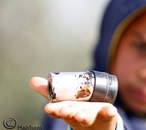
Dozens of Israeli soldiers attacked, Friday, the weekly nonviolent protest against the Annexation Wall and colonies, in Bil’in village, west of the central West Bank city of Ramallah.
The protest started from the center of the village, when locals, Israeli and international peace activists marched towards the villagers’ orchards, and the soldiers fired many gas bombs on them.
Haitham Khatib, a Palestinian cameraman and a well-known nonviolent activist against the Wall and colonies in Bil’in in Bil'in, said the soldiers used a new type of gas bombs that actually detonate after they hit their target.
"This is a very dangerous weapon; innocent peace-loving Palestinians are being used by the army to test Israel’s newest weapons," he said, "We have the right to assemble peacefully, and protest on our lands! We will continue our struggle."
The protest started from the center of the village, when locals, Israeli and international peace activists marched towards the villagers’ orchards, and the soldiers fired many gas bombs on them.
Haitham Khatib, a Palestinian cameraman and a well-known nonviolent activist against the Wall and colonies in Bil’in in Bil'in, said the soldiers used a new type of gas bombs that actually detonate after they hit their target.
"This is a very dangerous weapon; innocent peace-loving Palestinians are being used by the army to test Israel’s newest weapons," he said, "We have the right to assemble peacefully, and protest on our lands! We will continue our struggle."
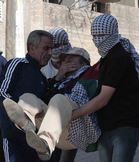
Israeli soldiers attacked, on Friday, the weekly protest in Kafr Qaddoum town, east of the northern West Bank city of Qalqilia, and shot a teenager with a gas bomb in the head, while many suffered the effects of teargas inhalation.
Morad Eshteiwy, the media spokesperson of the Popular Committee against the Wall and Settlements in Kafr Qaddoum, said the soldiers invaded the village, after surrounding it, and assaulted the protesters.
He added that the soldiers fired rubber-coated steel bullets, gas bombs and concussion grenades, wounding a young man, who was shot with a gas bomb in his head.
Many Palestinians suffered the effects of tear gas inhalation, especially after the soldiers fired many gas bombs into the village, also striking several homes.
Kafr Qaddoum residents have been protesting, for the fifth consecutive year, demanding Israel to reopen the town’s main road, that connects it with the surrounding Palestinian communities.
The soldiers closed the village’s main road, thirteen years ago, to allow easy access to the settlers driving to and from the illegal Kedumim colony, built on Palestinian lands.
Morad Eshteiwy, the media spokesperson of the Popular Committee against the Wall and Settlements in Kafr Qaddoum, said the soldiers invaded the village, after surrounding it, and assaulted the protesters.
He added that the soldiers fired rubber-coated steel bullets, gas bombs and concussion grenades, wounding a young man, who was shot with a gas bomb in his head.
Many Palestinians suffered the effects of tear gas inhalation, especially after the soldiers fired many gas bombs into the village, also striking several homes.
Kafr Qaddoum residents have been protesting, for the fifth consecutive year, demanding Israel to reopen the town’s main road, that connects it with the surrounding Palestinian communities.
The soldiers closed the village’s main road, thirteen years ago, to allow easy access to the settlers driving to and from the illegal Kedumim colony, built on Palestinian lands.
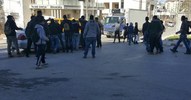
Two Palestinian young men suffered rubber bullet injuries during clashes with invading Israeli troops in Beit Ummar town, north of al-Khalil city.
Anti-settlement activist Mohamed Awad said that the clashes were concentrated in Safa area, where the soldiers fired rubber bullets and volleys of tear gas grenades at local young men.
Awad added that two young men received treatment in a medical center in the town after they suffered injuries from rubber bullets. Others also suffered from inhaling tear gas and were given on-site medical assistance.
During their campaign in the town, several soldiers occupied the rooftop of a house after searching it, according to the activist. In a separate incident, the Israeli occupation army installed an iron access gate at the entrance to Umm Rukba area south of al-Khader town in Bethlehem.
According to WAFA news agency, Israeli troops removed the concrete blocks which were closing the main road to Umm Rukba and set up a six-meter long iron gate in their place. This Israeli measure would force the residents of Umm Rukba to walk a long distance to al-Khader town.
Anti-settlement activist Mohamed Awad said that the clashes were concentrated in Safa area, where the soldiers fired rubber bullets and volleys of tear gas grenades at local young men.
Awad added that two young men received treatment in a medical center in the town after they suffered injuries from rubber bullets. Others also suffered from inhaling tear gas and were given on-site medical assistance.
During their campaign in the town, several soldiers occupied the rooftop of a house after searching it, according to the activist. In a separate incident, the Israeli occupation army installed an iron access gate at the entrance to Umm Rukba area south of al-Khader town in Bethlehem.
According to WAFA news agency, Israeli troops removed the concrete blocks which were closing the main road to Umm Rukba and set up a six-meter long iron gate in their place. This Israeli measure would force the residents of Umm Rukba to walk a long distance to al-Khader town.
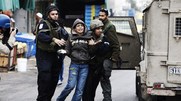
The Israeli police arrested late Thursday a Palestinian young man from Shufat refugee camp in occupied Jerusalem, bringing the number of Thursday’s detainees in the occupied city to 12 including six minors.
Israeli police claimed in a brief statement that the young man was arrested for being allegedly involved in stone-throwing attack on the light rail near Shufat town.
The young man’s arrest brought the whole number of Jerusalemite detainees who were arrested on Thursday to 12 including six minors.
Violent clashes had then erupted near Shufat checkpoint when Israeli police fired heavy teargas bombs and rubber bullets at locals. Similar clashes were reported in Abu Dis town east, of the occupied city, following the arrest of a local youngster at the hands of Israeli Special Forces.
Israeli police claimed in a brief statement that the young man was arrested for being allegedly involved in stone-throwing attack on the light rail near Shufat town.
The young man’s arrest brought the whole number of Jerusalemite detainees who were arrested on Thursday to 12 including six minors.
Violent clashes had then erupted near Shufat checkpoint when Israeli police fired heavy teargas bombs and rubber bullets at locals. Similar clashes were reported in Abu Dis town east, of the occupied city, following the arrest of a local youngster at the hands of Israeli Special Forces.
25 feb 2016
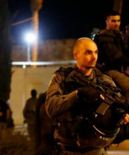
The Palestinian Prisoners Society (PPS) has reported that Israeli soldiers have kidnapped eleven additional Palestinians in the occupied West Bank, raising the number of kidnapped residents since dawn to at least 35.
The PPS said the soldiers searched and ransacked dozens of homes in Hebron, in the southern part of the occupied West bank and kidnapped seven Palestinians, identified as Anas Sa’id, Mustafa al-Bostanji, Ayatollah Jabara, Mohannad Shweiki, Ziad Abdul-Qader Abu ‘Aisha, Mohannad Shweiki and Amjad Rajabi.
In addition, the soldiers invaded the al-Khader town, south of Bethlehem, and kidnapped Mohammad Omar Salah, 25.
The PPS added that the soldiers invaded Tammoun town, in the central West Bank district of Tubas, and kidnapped one Palestinian, identified as Mansour Bani Odeh.
In Ramallah, the soldiers kidnapped Mohammad Fahmi Sbeih from the al-Jalazoun refugee camp, and Mojahed al-Asmar from Beit Rima town.
-- --
Updated from previous artice:
The Palestinian Prisoners Society (PPS) has reported that Israeli soldiers have kidnapped, on Thursday at dawn, at least 24 Palestinians, during extensive invasions and military searches of homes, in different parts of the occupied West Bank. Two Palestinians injured near Ramallah.
The PPS said that the soldiers invaded various communities in the northern West Bank district of Jenin, and kidnapped three Palestinians from Qabatia town, south of Jenin city. The kidnapped have been identified as Ibrahim Ahmad Khazamia, Zeidan Fadel Nazzal and his brother Omran.
The PPS added that the army also invaded and searched many homes in the northern West Bank city of Tulkarem, and Bal’a nearby town, and kidnapped four Palestinians.
The kidnapped Palestinians have been identified as Moath Naji Barabra, 17, Mahdi Hasan al-Hajj, 24, from Bal’a, in addition to Mos’ab Amer an-Najdi, 24, and his brother Mohammad, 28, from the Eastern Neighborhood of Tulkarem city.
In Nablus district, also in the northern part of the occupied West Bank, the soldiers stormed and ransacked dozens of homes and kidnapped eight Palestinians.
The PPS said the soldiers kidnapped Wahid Husam Ziyada, 25, Shaheed Ghassan Ziyada, 30, and Mohammad Zaher Qet, 27, from Madama village, south of Nablus, while Abdul-Rahman Yassin Jabali, 30, and Waleed Jarrah Obeidat, 27, were kidnapped from their homes in ‘Awarta town, south of Nablus, and Mohammad Mahdi Hajji, 20, was taken prisoner from his home in Einabous town, south of Nablus.
The army also kidnapped Odai Adnan Balatya, 21, from al-Bathan town, after summoning them for interrogation in a nearby military and security base.
Another Palestinian, identified as Monther Mustafa Eshteyya, from Beit Forik town, east of Nablus, was kidnapped in Jerusalem. The army alleged the Palestinian did not carry an entry or work permit.
Furthermore, clashes took place in Beit Rima town, northwest of Ramallah, after several Israeli military vehicles invaded it, and fired live rounds, rubber-coated metal bullets and gas bombs.
Medical sources said one Palestinian suffered a moderate injury, after the soldiers shot him with a live round in his back, while another Palestinian was shot in his right arm.
The soldiers also searched homes throughout the town, and kidnapped a former political prisoner, identified as Mojahed Khader Rimawi, who was previously imprisoned by Israel for 16 months.
In the Hebron district, in the southern part of the occupied West Bank, the soldiers broke into and searched many homes, in Hebron city and nearby villages and towns, and kidnapped five Palestinians, identified as Ehab Shafiq al-Qawasmi, Mahmoud Radi Za’areer, Abdul-Hadi Riyad Abu Aida, Mohammad Hilmi Abu Safiyya, and Yasser Harbi Yaghmour.
In occupied Jerusalem, the soldiers invaded Hizma town, searched many homes and kidnaped four Palestinians, before moving them to an interrogation center in the city. The kidnapped have been identified as Hasan Mahmoud Khatib, Mohammad Mahmoud Khatib, Ali Yasser Khatib and Mohammad Khalil Salaheddin.
On Wednesday evening, a number of extremist Israeli colonizers assaulted many Palestinians, living near the Ibrahimi Mosque, in the center of Hebron city, causing various cuts and bruises that required hospitalization.
The PPS said the soldiers searched and ransacked dozens of homes in Hebron, in the southern part of the occupied West bank and kidnapped seven Palestinians, identified as Anas Sa’id, Mustafa al-Bostanji, Ayatollah Jabara, Mohannad Shweiki, Ziad Abdul-Qader Abu ‘Aisha, Mohannad Shweiki and Amjad Rajabi.
In addition, the soldiers invaded the al-Khader town, south of Bethlehem, and kidnapped Mohammad Omar Salah, 25.
The PPS added that the soldiers invaded Tammoun town, in the central West Bank district of Tubas, and kidnapped one Palestinian, identified as Mansour Bani Odeh.
In Ramallah, the soldiers kidnapped Mohammad Fahmi Sbeih from the al-Jalazoun refugee camp, and Mojahed al-Asmar from Beit Rima town.
-- --
Updated from previous artice:
The Palestinian Prisoners Society (PPS) has reported that Israeli soldiers have kidnapped, on Thursday at dawn, at least 24 Palestinians, during extensive invasions and military searches of homes, in different parts of the occupied West Bank. Two Palestinians injured near Ramallah.
The PPS said that the soldiers invaded various communities in the northern West Bank district of Jenin, and kidnapped three Palestinians from Qabatia town, south of Jenin city. The kidnapped have been identified as Ibrahim Ahmad Khazamia, Zeidan Fadel Nazzal and his brother Omran.
The PPS added that the army also invaded and searched many homes in the northern West Bank city of Tulkarem, and Bal’a nearby town, and kidnapped four Palestinians.
The kidnapped Palestinians have been identified as Moath Naji Barabra, 17, Mahdi Hasan al-Hajj, 24, from Bal’a, in addition to Mos’ab Amer an-Najdi, 24, and his brother Mohammad, 28, from the Eastern Neighborhood of Tulkarem city.
In Nablus district, also in the northern part of the occupied West Bank, the soldiers stormed and ransacked dozens of homes and kidnapped eight Palestinians.
The PPS said the soldiers kidnapped Wahid Husam Ziyada, 25, Shaheed Ghassan Ziyada, 30, and Mohammad Zaher Qet, 27, from Madama village, south of Nablus, while Abdul-Rahman Yassin Jabali, 30, and Waleed Jarrah Obeidat, 27, were kidnapped from their homes in ‘Awarta town, south of Nablus, and Mohammad Mahdi Hajji, 20, was taken prisoner from his home in Einabous town, south of Nablus.
The army also kidnapped Odai Adnan Balatya, 21, from al-Bathan town, after summoning them for interrogation in a nearby military and security base.
Another Palestinian, identified as Monther Mustafa Eshteyya, from Beit Forik town, east of Nablus, was kidnapped in Jerusalem. The army alleged the Palestinian did not carry an entry or work permit.
Furthermore, clashes took place in Beit Rima town, northwest of Ramallah, after several Israeli military vehicles invaded it, and fired live rounds, rubber-coated metal bullets and gas bombs.
Medical sources said one Palestinian suffered a moderate injury, after the soldiers shot him with a live round in his back, while another Palestinian was shot in his right arm.
The soldiers also searched homes throughout the town, and kidnapped a former political prisoner, identified as Mojahed Khader Rimawi, who was previously imprisoned by Israel for 16 months.
In the Hebron district, in the southern part of the occupied West Bank, the soldiers broke into and searched many homes, in Hebron city and nearby villages and towns, and kidnapped five Palestinians, identified as Ehab Shafiq al-Qawasmi, Mahmoud Radi Za’areer, Abdul-Hadi Riyad Abu Aida, Mohammad Hilmi Abu Safiyya, and Yasser Harbi Yaghmour.
In occupied Jerusalem, the soldiers invaded Hizma town, searched many homes and kidnaped four Palestinians, before moving them to an interrogation center in the city. The kidnapped have been identified as Hasan Mahmoud Khatib, Mohammad Mahmoud Khatib, Ali Yasser Khatib and Mohammad Khalil Salaheddin.
On Wednesday evening, a number of extremist Israeli colonizers assaulted many Palestinians, living near the Ibrahimi Mosque, in the center of Hebron city, causing various cuts and bruises that required hospitalization.
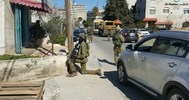
The Israeli Occupation Forces (IOF) stormed Thursday afternoon Beita town south of Nablus, which led to the outbreak of violent clashes.
The PIC news reporter quoted local sources as saying that a number of Israeli troops broke into the town and deployed in its neighborhoods amid heavy fire of teargas bombs at local houses.
Locals responded by throwing stones and empty bottles at the invading soldiers. During the raid, Israeli forces closed the main road between Nablus and Ramallah and prevented locals’ movement in both directions.
The PIC news reporter quoted local sources as saying that a number of Israeli troops broke into the town and deployed in its neighborhoods amid heavy fire of teargas bombs at local houses.
Locals responded by throwing stones and empty bottles at the invading soldiers. During the raid, Israeli forces closed the main road between Nablus and Ramallah and prevented locals’ movement in both directions.
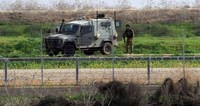
The Israeli occupation forces (IOF) on Thursday morning targeted Palestinian farmers and fishermen in the Gaza Strip, with no reported casualties.
Media sources said that Israeli soldiers opened fire from military posts and vehicles in a border area to the east of Khan Younis district, south of Gaza, at farmers, bird hunters and shepherds as well as houses.
They added that the eastern borderline of Gaza saw military moves and drone overflights during the gunfire attack.
In another incident, Israeli gunboats also opened fire from large guns at Palestinian fishermen and their boats inside the northern waters of Gaza. The intensity of the shelling at the boats forced all the fishermen to return ashore.
Media sources said that Israeli soldiers opened fire from military posts and vehicles in a border area to the east of Khan Younis district, south of Gaza, at farmers, bird hunters and shepherds as well as houses.
They added that the eastern borderline of Gaza saw military moves and drone overflights during the gunfire attack.
In another incident, Israeli gunboats also opened fire from large guns at Palestinian fishermen and their boats inside the northern waters of Gaza. The intensity of the shelling at the boats forced all the fishermen to return ashore.
24 feb 2016
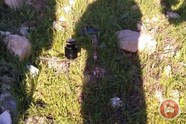
Israeli forces have reportedly been implementing a 'tripwire explosive device' to prevent Palestinians from approaching areas near illegal Israeli settlements and roads in the occupied West Bank, a PA official said Wednesday.
Issa Ghuneimat, Director of Operations at the PA’s Palestinian Mine Action Center, told Ma’an that the device operates as “a trap targeting Palestinian citizens.” A tripwire attached to the device explodes on impact, producing large amounts of light, according to the official.
“They use this device instead of having a 24-hour-a-day military patrol. When it goes off, military patrols will see the light and rush to the area,” Ghuneimat said.
Though the device is intended to emit light in order to notify Israeli forces that someone is approaching, Ghuneimat said that when detonated, the device “releases shrapnel that could kill if they hit a human body directly.”
The official highlighted what he said was Israel’s potentially fatal use of the device, which is not clearly marked, comparing the tactic to the use of landmines.
Issa Ghuneimat, Director of Operations at the PA’s Palestinian Mine Action Center, told Ma’an that the device operates as “a trap targeting Palestinian citizens.” A tripwire attached to the device explodes on impact, producing large amounts of light, according to the official.
“They use this device instead of having a 24-hour-a-day military patrol. When it goes off, military patrols will see the light and rush to the area,” Ghuneimat said.
Though the device is intended to emit light in order to notify Israeli forces that someone is approaching, Ghuneimat said that when detonated, the device “releases shrapnel that could kill if they hit a human body directly.”
The official highlighted what he said was Israel’s potentially fatal use of the device, which is not clearly marked, comparing the tactic to the use of landmines.
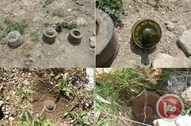
According to Ghuneimat, one of the devices was recently found in Salfit district in the central West Bank, as well as in the car park of a stadium in the Bethlehem-area al-Khader town.
A Palestinian intelligence officer last week said a “suspicious object” was found adjacent to al-Khader football stadium. The PA’s military liaison office reportedly contacted its Israeli counterpart, and the device was removed shortly after by Israeli forces.
An Israeli army spokesperson was unable to confirm the reports at the time.
Ghuneimat said the stadium -- like many areas where the devices are used -- is located in Area C, where Palestinian security forces are unable to enter without coordination with the Israeli military which has full control over the area.
While the explosive devices do not hold the destructive power of landmines, the PA official said the West Bank used to be littered with landmines, used during Israel’s illegal takeover of the area from Jordan in 1967.
Ghuneimat said that the PA’s Palestinian Mine Action Center launched a project in 2014 to clear all landmines in the occupied West Bank, which has so far removed at least 210 mines from the Bethlehem-area town of Husan and Nabi Elias in Qalqilya.
A Palestinian intelligence officer last week said a “suspicious object” was found adjacent to al-Khader football stadium. The PA’s military liaison office reportedly contacted its Israeli counterpart, and the device was removed shortly after by Israeli forces.
An Israeli army spokesperson was unable to confirm the reports at the time.
Ghuneimat said the stadium -- like many areas where the devices are used -- is located in Area C, where Palestinian security forces are unable to enter without coordination with the Israeli military which has full control over the area.
While the explosive devices do not hold the destructive power of landmines, the PA official said the West Bank used to be littered with landmines, used during Israel’s illegal takeover of the area from Jordan in 1967.
Ghuneimat said that the PA’s Palestinian Mine Action Center launched a project in 2014 to clear all landmines in the occupied West Bank, which has so far removed at least 210 mines from the Bethlehem-area town of Husan and Nabi Elias in Qalqilya.
As Palestinian school children shuffled through the Salaymeh checkpoint, Israeli forces carefully watched over them as if they were a serious security threat. The slow and broken process of queuing in the cold, taking off belts and other items whilst searching bags and bodies is a painful one to watch.
In the only act of defiance that an eight year old can show, one Palestinian boy returns from beyond the checkpoint to throw stones at the soldiers. In many countries, such behaviour might be met with serious talks between the child’s parents and authorities. But not in occupied Palestine. Here in Palestine, Israeli forces regularly respond with tear gas, rubber coated steel bullets and stun grenades to stone throwing children.
Today was no different. Israeli soldiers gathered, staring through the scopes of their assault rifles, in order to intimidate and keep a forceful eye over the children. Soon after, a stun grenade is thrown by the occupied forces down the busy street. The stun grenade is off target and smashes a Palestinian car window before exploding. The distress is clear on the faces of innocent bystanders and school children as many flee and one young boy attempts to turn back through the checkpoint in fear.
”It was beyond unnecessary. To see a stun grenade being used to control an unarmed eight year old is disgusting. And who will pay for the poor Palestinians car damage? Not Israel. They are never held accountable no matter how minor or great the crime.”
For many, the rain would be enough to take the day off, but, for eager kinds in Palestine, not even the oppression from the Israeli military can deter them from getting to their place of learning. But, it won’t go unnoticed.
The effects of such appalling and degrading harassment will slowly wear down on the minds of these bright school kids. Sadly, as the children of Palestine are exposed to never ending violence and oppression, much of the world sits patiently watching the inhumanity of the apartheid regime, as if a greater reason exists to bring an end to this tyranny than the safety of the children’s lives.
In the only act of defiance that an eight year old can show, one Palestinian boy returns from beyond the checkpoint to throw stones at the soldiers. In many countries, such behaviour might be met with serious talks between the child’s parents and authorities. But not in occupied Palestine. Here in Palestine, Israeli forces regularly respond with tear gas, rubber coated steel bullets and stun grenades to stone throwing children.
Today was no different. Israeli soldiers gathered, staring through the scopes of their assault rifles, in order to intimidate and keep a forceful eye over the children. Soon after, a stun grenade is thrown by the occupied forces down the busy street. The stun grenade is off target and smashes a Palestinian car window before exploding. The distress is clear on the faces of innocent bystanders and school children as many flee and one young boy attempts to turn back through the checkpoint in fear.
”It was beyond unnecessary. To see a stun grenade being used to control an unarmed eight year old is disgusting. And who will pay for the poor Palestinians car damage? Not Israel. They are never held accountable no matter how minor or great the crime.”
For many, the rain would be enough to take the day off, but, for eager kinds in Palestine, not even the oppression from the Israeli military can deter them from getting to their place of learning. But, it won’t go unnoticed.
The effects of such appalling and degrading harassment will slowly wear down on the minds of these bright school kids. Sadly, as the children of Palestine are exposed to never ending violence and oppression, much of the world sits patiently watching the inhumanity of the apartheid regime, as if a greater reason exists to bring an end to this tyranny than the safety of the children’s lives.
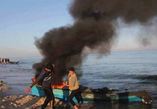
Israeli navy ships opened fire, Wednesday, on a number of Palestinian fishing boats near the shore, in the central part of the Gaza Strip, and northwest of Gaza city, causing damage.
The navy fired dozens of rounds at the fishing boats while they were only four nautical miles away from the Gaza shore, forcing the fishers back to shore, without being able to fish to provide for their families.
The navy also opened fire on fishing boats in the Sudaniyya Sea area, northwest of Gaza city, causing property damage.
The navy frequently attacks fishing boats in Gaza, and repeatedly kidnaps fishers and confiscates their boats. Such attacks led to dozens of casualties, including many fatalities, in addition to the abduction of many fishers.
The navy fired dozens of rounds at the fishing boats while they were only four nautical miles away from the Gaza shore, forcing the fishers back to shore, without being able to fish to provide for their families.
The navy also opened fire on fishing boats in the Sudaniyya Sea area, northwest of Gaza city, causing property damage.
The navy frequently attacks fishing boats in Gaza, and repeatedly kidnaps fishers and confiscates their boats. Such attacks led to dozens of casualties, including many fatalities, in addition to the abduction of many fishers.
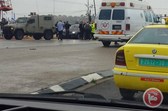
A Palestinian young man was moderately injured after being shot by Israeli Occupation Forces (IOF) Wednesday afternoon over an alleged stabbing attack near the illegal Gush Etzion settlement bloc north of al-Khalil.
An Israeli soldier was pronounced dead during the alleged attack, while the Palestinian suspect suffered moderate injuries.
Israeli media sources said that the Israeli soldier was mistakenly shot by his colleagues during the incident before he succumbed to his wounds. An Israeli army spokesperson identified the soldier as Eliav Gelman, 30.
Palestinian sources, on the other hand, identified the injured Palestinian as Mamdouh Yousef Amr. Israeli soldiers were seen in photos standing over the legs of the injured Palestinian to make sure he does not move.
Earlier Wednesday, Israeli sources declared the arrest of a Palestinian minor for allegedly trying to carry out a stabbing attack in Rahet city within the Green Line in early February. An Israeli settler was injured during the alleged attack.
More than 180 Palestinians have been killed by Israeli forces and settlers since October 1. Israel says the majority were shot dead while attempting to carry out attacks, although international rights groups have disputed Israel's version of events in several cases.
UN Secretary-General Ban Ki-moon said last month it was "human nature for Palestinians to react violently to Israel's nearly 50-year military occupation”, as he urged a change in Israeli policy in the occupied Palestinian territories.
Israeli forces shoot Palestinian, Israeli by accident after alleged attack
Israeli forces shot and wounded a Palestinian man and, accidentally, an Israeli, following an alleged stabbing attempt near the illegal Gush Etzion settlement bloc south of Bethlehem on Wednesday, the Israeli army said.
An Israeli army spokesperson said that Israeli forces opened fire on the Palestinian after he attempted to carry out a stabbing attack. They shot both him and an Israeli accidentally.
The spokesperson said both the Israeli and the Palestinian were evacuated to hospital. A spokesperson for Israel's emergency medical service Magen David Adom said medics were treating one "victim of about 20 (years old) in severe condition."
Israeli news site Haaretz reported that the shots may have been fired by an armed Israeli settler, although this could not initially be verified.
No stabbing wounds were reported.
More than 170 Palestinians have now been killed by Israeli forces and settlers since October. Israel says the majority were shot dead while attempting to carry out attacks, although international rights groups have disputed Israel's version of events in several cases.
The attacks that have taken place -- mostly by Palestinian individuals armed only with knives -- have killed nearly 30 Israelis.
UN Secretary-General Ban Ki-moon said last month it was "human nature" for Palestinians to react violently to Israel's nearly 50-year military occupation, as he urged a change in Israeli policy in the occupied Palestinian territory.
An Israeli soldier was pronounced dead during the alleged attack, while the Palestinian suspect suffered moderate injuries.
Israeli media sources said that the Israeli soldier was mistakenly shot by his colleagues during the incident before he succumbed to his wounds. An Israeli army spokesperson identified the soldier as Eliav Gelman, 30.
Palestinian sources, on the other hand, identified the injured Palestinian as Mamdouh Yousef Amr. Israeli soldiers were seen in photos standing over the legs of the injured Palestinian to make sure he does not move.
Earlier Wednesday, Israeli sources declared the arrest of a Palestinian minor for allegedly trying to carry out a stabbing attack in Rahet city within the Green Line in early February. An Israeli settler was injured during the alleged attack.
More than 180 Palestinians have been killed by Israeli forces and settlers since October 1. Israel says the majority were shot dead while attempting to carry out attacks, although international rights groups have disputed Israel's version of events in several cases.
UN Secretary-General Ban Ki-moon said last month it was "human nature for Palestinians to react violently to Israel's nearly 50-year military occupation”, as he urged a change in Israeli policy in the occupied Palestinian territories.
Israeli forces shoot Palestinian, Israeli by accident after alleged attack
Israeli forces shot and wounded a Palestinian man and, accidentally, an Israeli, following an alleged stabbing attempt near the illegal Gush Etzion settlement bloc south of Bethlehem on Wednesday, the Israeli army said.
An Israeli army spokesperson said that Israeli forces opened fire on the Palestinian after he attempted to carry out a stabbing attack. They shot both him and an Israeli accidentally.
The spokesperson said both the Israeli and the Palestinian were evacuated to hospital. A spokesperson for Israel's emergency medical service Magen David Adom said medics were treating one "victim of about 20 (years old) in severe condition."
Israeli news site Haaretz reported that the shots may have been fired by an armed Israeli settler, although this could not initially be verified.
No stabbing wounds were reported.
More than 170 Palestinians have now been killed by Israeli forces and settlers since October. Israel says the majority were shot dead while attempting to carry out attacks, although international rights groups have disputed Israel's version of events in several cases.
The attacks that have taken place -- mostly by Palestinian individuals armed only with knives -- have killed nearly 30 Israelis.
UN Secretary-General Ban Ki-moon said last month it was "human nature" for Palestinians to react violently to Israel's nearly 50-year military occupation, as he urged a change in Israeli policy in the occupied Palestinian territory.

Hundreds of Palestinian mourners carried on Tuesday the bodies of Mansour al-Shawamrah, 20, and Omar Amr, 20, during their joint funeral in al-Qubeiba village, in northern Occupied Jerusalem.
Both Palestinians were shot and killed by the Israeli occupation police on February 14 after they carried out an anti-occupation attack in Bab al-Amoud area, in Occupied Jerusalem.
The Israeli occupation soldiers cracked down on the Palestinian mourners during the funeral procession, sparking violent clashes. Several mourners were left wounded after the occupation troops discharged heavy spates of rubber bullets and teargas canisters.
The Israeli occupation authorities have been withholding the bodies of 10 slain Palestinians from Occupied Jerusalem. Another funeral was held in Bethlehem city for the slain anti-occupation youth Khaled Taqatqa, 22.
Thousands marched in the funeral procession, carrying Taqatqa’s body from the Beit Jala public hospital to his family home in Beit Fajjar, where his parents, friends, and relatives bid him last farewell. Taqatqa was killed on Friday in clashes with the Israeli occupation soldiers near Beit Fajjar’s western entrance.
Both Palestinians were shot and killed by the Israeli occupation police on February 14 after they carried out an anti-occupation attack in Bab al-Amoud area, in Occupied Jerusalem.
The Israeli occupation soldiers cracked down on the Palestinian mourners during the funeral procession, sparking violent clashes. Several mourners were left wounded after the occupation troops discharged heavy spates of rubber bullets and teargas canisters.
The Israeli occupation authorities have been withholding the bodies of 10 slain Palestinians from Occupied Jerusalem. Another funeral was held in Bethlehem city for the slain anti-occupation youth Khaled Taqatqa, 22.
Thousands marched in the funeral procession, carrying Taqatqa’s body from the Beit Jala public hospital to his family home in Beit Fajjar, where his parents, friends, and relatives bid him last farewell. Taqatqa was killed on Friday in clashes with the Israeli occupation soldiers near Beit Fajjar’s western entrance.
